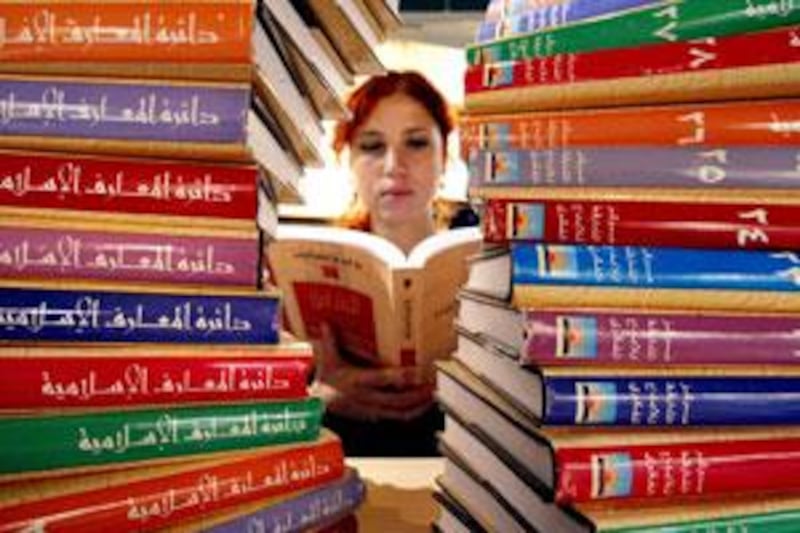Translation used to be the lifeblood of Arabic culture. During the first millennium, libraries at Cordoba in the West and Baghdad in the East absorbed the wisdom of the myriad cultures who had occupied this tranche of the globe. Armies of scholars and scribes translated it into Arabic, in the process establishing their tongue as one of the great languages of learning, a rival to Latin and Greek. As Sharjah University's Dr Said Faiq noted in this paper last week, their work "laid the foundation for a golden age... making Arabic the global language of the time".
Somehow, that project lost momentum. A widely quoted UN paper on development in the Arab world, produced in 2003, found that more books were translated into Spanish annually than had been translated into Arabic throughout the entire 1,000 years preceding the report. Not an inspiring statistic. There are several sources of hope for a renaissance, however. Adach's Kalima initiative has set out, in the words of Adach's director of art and culture Abdullah al Amri, "to make our library in the Arab world more rich". To this end, the programme is working to "translate the mother-books of science and philosophy and literature and different sectors of art into the Arabic language." Kalima's recently announced the publication of five encyclopaedias of world literature and a joint venture with Johannes Gutenberg University to produce translations of 30 of the pinnacles of German literature in verse and prose. That, and Kalima's numerous other projects, ought to go some way to redress the balance.
"And vice versa," said al Amri. This is important, because Arabic literature thrives on translation into other languages. Denys Johnson-Davies, the most celebrated translator of Arabic into English (he won the inaugural Sheikh Zayed Award for Personality of the Year in 2007), and the first translator of modern Arabic fiction, notes that for many Arab authors, their work is only remunerated once it enters western markets. Arabic readerships are too small and copyright infringement is too widespread to turn a profit. Stick within the East, he says, and there's "no way can you make a living out of it". Recalling the careers of Tawfiq el Hakim and Yusuf Idris, Johnson-Davies notes: "It's only really when these books began getting translated that the whole thing became of some sort of financial interest."
"Look what the Naguib Mahfouz Prize does for you," he says. "The book that wins gets translated and published in English. And so now, people have woken up to the fact that if you get translated into English, you are also likely to get translated into Italian and Spanish and so on, because… very often, the Italians or the Spanish are translating from the English." For more than 60 years, Johnson-Davies has continued to help authors through that crucial gateway. He has, for example, translated the novel Hunger by Mohammad al Bisatie. And this year's Abu Dhabi International Book Fair sees the launch of a special compendium of Emirati short fiction that he selected and translated for the occasion. In a Fertile Desert includes a tale by the renowned writer Mohammed al Murr, plus 19 pieces by unknown talents whom Johnson-Davies discovered by trawling the internet. "I wanted local stories," he says, "so that the English people who are living here, who know nothing at all about the background of the place, get some sort of idea of the background - stories about pearl fishing, hunting with hawks, camels, desert…"
Kitab, the body behind the Abu Dhabi International Book Fair, is also working to increase the flow of traffic across the great linguistic divide. "We have to work on the market and prepare the market and make the market more accessible for foreign publishers," says Claudia Kaiser, Kitab's general manager. "That means we have to work on all the challenges that exist in the market." To this end, Kitab is campaigning to advance the legal purchase of publishing rights - and by extension, the proper compensation of authors.
"Because piracy is obviously a big issue in the Middle East and North Africa region," says Kaiser, "we want to encourage publishers to actually acquire the rights when they do a translation... That's why we developed an initiative called Spotlight on Rights. This is a subsidy for rights deals. If an Arab publisher buys a right from a foreign publisher, and they are both at the fair, they can apply for a subsidy."
The same goes for foreign publishers buying the rights to Arab works in translation. The expected value of each subsidy is around $1,000 (Dh3,700), which ought to help get some of that Arabic talent out to a wider western audience. Readers and writers alike deserve no less.






